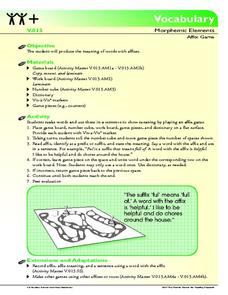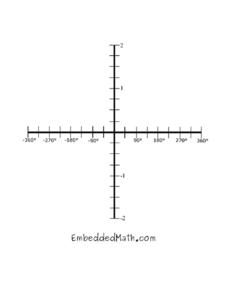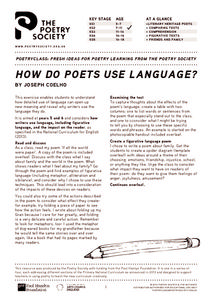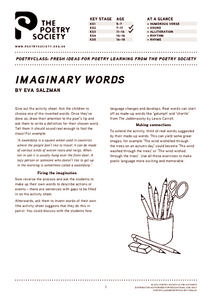Growing Classroom
Space Travelers
Groups of three scientists from the rocky planet Zog investigate the composition of soil so that they can take the information back to their home, create soil there, and begin to grow food.
Crafting Freedom
Harriet Jabocs and Elizabeth Keckly: The Material and Emotional Realities of Childhood in Slavery
Through the journals written by Harriet Jacobs and Elizabeth Keckly, young readers gain insight into the lives of two enslaved children on nineteenth-century plantations.
Fun Music Company
Lifesavers for the Music Teacher
A symphony of ideas are contained in this eBook designed by music teachers for music teachers. The 40 activities have all proven to be lifesavers. A must-have for your curriculum library.
Project Noah
Writing Goes Wild
Young scientists develop their observation and writing skills as they craft and then post a detailed description of a plant or animal they have spotted and photographed.
Curated OER
Trig Cheat Sheet
Your pre-calculus learners will make use of this wonderful cheat sheet that summarizes all things trigonometric. Definitions based on both the unit circle and the right triangle are included, as well as many convenient trigonometric...
Florida Center for Reading Research
Vocabulary Morphemic Elements: Affix Game
How well do you know your affixes? Find out how proficient your learners are with a game that requires them to define various affixes and use them to create words that will go into sentences.
Embedded Math
Trig Graph
You and your learners will enjoy having many copies of this trigonometric graph set on the Cartesian coordinate grid with a domain running from -360 degrees to 360 degrees and a range running from -2 to 2.
Embedded Math
The Unit Circle
You and your learners will enjoy having a nicely organized, typed up unit circle, all filled in with degrees and radians as well as cartesian coordinates.
Jamie York Press
Pythagorean Theorem Cutout Puzzle
If you'd like your lesson on the Pythagorean Theorem to be fun and engaging, check out a math puzzle activity for high schoolers. Your learners will enjoy this visual puzzle that shows how the Pythagorean Theorem works.
MENSA Education & Research Foundation
It’s Greek to Me: Greek Mythology
Designed as extension exercises in homeschool or classroom settings, as well as for individual work, the ideas in this packet are sure to engage learners in an investigation of Greek mythology.
Briscoe Center for American History
Mary Maverick and Texas History - Part 2
To conclude their investigation of the life of Mary Maverick and to demonstrate their ability to analyze primary source documents, groups use the SOAPS questioning method to examine Maverick's account of events in early Texas history.
Briscoe Center for American History
Mary Maverick and Texas History - Part 1
What's the difference between a diary and a memoir? Young historians explore the ramifications of this question as they learn how to use primary source materials to gain an understanding of life on the Texas frontier.
Briscoe Center for American History
Applying the SOAPS Method of Analyzing Historical Documents
Young historians use the SOAPS (Speaker, Occasion, Audience, Purpose, Subject) method of questioning to determine the historical value of primary source documents. The third in a series of five lessons that model for learners how...
Scholastic
Step-by-Step Strategies for Teaching Expository Writing
A carefully crafted, logically organized, 128-page packet is an excellent addition to your unit on expository writing.
Poetry Class
Eccentricity and Sound
What do Lady Gaga and Dame Edith Sitwell have in common? As they examine Sitwell's poetry, class members learn that the similarities are far more than their unique appearance.
Poetry Society
How do Poets Use Language?
Why do writers choose the language they do? Here's a resource that has the poet himself answer that very question. Joseph Coelho explains why he chose the words and images he used in his poem, "If All the World Were Paper."
Have Fun Teaching
The State of Things
Is it a solid, liquid. or gas? Cut out these graphics for a fun manipulative game that has kids sorting everyday items into their states of matter. They complete three worksheets referencing the sorting activity.
Poetry Society
Simile and Metaphor
Young poets use word cards to prompt a metaphor poem comparing to very dissimilar items.
Poetry Society
A Conceit Poem
Young writers needn't be self-involved to craft a conceit. Directions for how to craft this form of extended metaphor, models, and a worksheet are all included in the packet.
Poetry Society
Imaginary Words
Oh, what fun! Young logophiles and neologists create a dictionary-sounding definition for imaginary words and try to fool their classmates.
Poetry Society
War Horse and WWI Poetry
Here's a resource that deserves a place in your curriculum library. As part of their study of War Horse individuals create an anthology of World War I poetry.
Teacher's Corner
Tanka
The Tanka, another fix from of Japanese poetry, is featured in the final exercise in a 10-part series of poetry writing activities.
Teacher's Corner
Diamonte (dee-a-MON-tay)
Did you say a diamonte? Ask your young poets to craft and polish this gem of a form poem. The fifth in a series of ten poetry writing exercises.
Teacher's Corner
Cinquain (sink-ain)
The cinquain, a five line, fixed-form poem that features one subject, is the focus of the third exercise in a series of ten poetry writing resources.

























